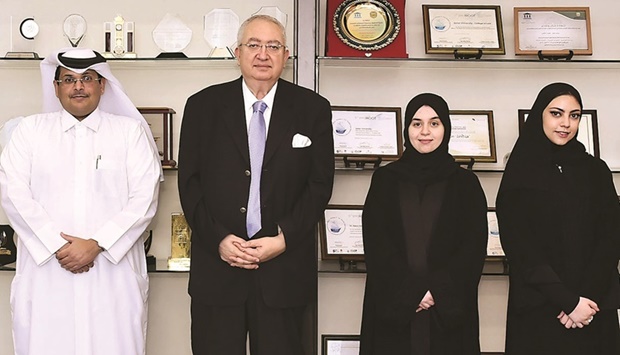The College of Law at Qatar University (QU) will host a Legal Aid Conference titled 'Ways and Challenges' on February 21 and 22.
The aim of the conference is to shed light on the legal aid system, by posing five problems, College of Law dean Dr Muna al-Marzouqi told a press conference recently.
Legal Skills Department head and clinical professor of law Dr Mohamed Y Mattar, lecturer of private law Mohammed Alkaabi, and teaching assistant Prof Duha al-Malki were present.
The first problem to be explored is about the concept of legal aid and whether it is limited to criminal cases or does it include civil and administrative issues and personal status.
The second is about the rules that determine a person’s right to obtain legal aid. On legal aid, is it advisable to include it in a comprehensive independent law or is the legislative framework limited to raising the issue in separate laws?
The third is: Who provides legal aid, if the lawyer is entrusted with doing this, what about legal aides, legal clinics and other elements of the civil society. The fourth: What is the body or body that regulates legal aid, determine who has the right to obtain it, and indicate the necessary procedures for this. The fifth: How can we face challenges in implementing the legal aid system, especially by reconciling traditional rules in the practice of the legal profession with international principles Expanding the provision of legal aid to vulnerable groups.
Dr al-Marzouqi said the target audience for this conference comprise the United Nations offices and agencies operating in and outside Qatar, ministries, government agencies and institutions, the Supreme Judicial Council and the Public Prosecution, private institutions of public interest in Qatar, experts, researchers and professors in the fields of law, sociology and social service, law schools in Qatar and abroad, law firms in Qatar, students of law schools in Qatar and abroad.
A large number of researchers from Jordan, Syria, Kuwait, the UAE, Saudi Arabia, Oman, Algeria, the US, Australia, France, Nigeria and India are expected to present papers.
Legal Skills Department head and clinical professor of law Dr Mohamed Y Mattar, lecturer of private law Mohammed Alkaabi, and teaching assistant Prof Duha al-Malki were present.
The first problem to be explored is about the concept of legal aid and whether it is limited to criminal cases or does it include civil and administrative issues and personal status.
The second is about the rules that determine a person’s right to obtain legal aid. On legal aid, is it advisable to include it in a comprehensive independent law or is the legislative framework limited to raising the issue in separate laws?
The third is: Who provides legal aid, if the lawyer is entrusted with doing this, what about legal aides, legal clinics and other elements of the civil society. The fourth: What is the body or body that regulates legal aid, determine who has the right to obtain it, and indicate the necessary procedures for this. The fifth: How can we face challenges in implementing the legal aid system, especially by reconciling traditional rules in the practice of the legal profession with international principles Expanding the provision of legal aid to vulnerable groups.
Dr al-Marzouqi said the target audience for this conference comprise the United Nations offices and agencies operating in and outside Qatar, ministries, government agencies and institutions, the Supreme Judicial Council and the Public Prosecution, private institutions of public interest in Qatar, experts, researchers and professors in the fields of law, sociology and social service, law schools in Qatar and abroad, law firms in Qatar, students of law schools in Qatar and abroad.
A large number of researchers from Jordan, Syria, Kuwait, the UAE, Saudi Arabia, Oman, Algeria, the US, Australia, France, Nigeria and India are expected to present papers.

